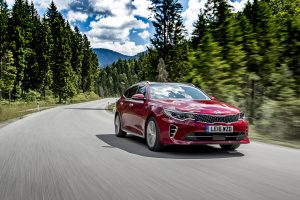Darren Cassey welcomes this foray into the world of estates – but although the ride is refined, he feels let down
What is it?
The load-lugging version of Kia’s compact executive saloon. Sportswagon is just fancy Kia-speak for estate, and it’s a welcome addition to the Optima range because estates make up two-thirds of sales and 75 per cent of fleet sales in this segment.
What’s under the bonnet?
As with the saloon, there’s only one engine – a 1.7-litre turbodiesel with 139bhp and 340Nm of torque – but it feels a lot more sluggish. It also has the  slightly clattery character of old diesel engines. However, its redeeming feature is economy – the manual is rated 64.2mpg and 113g/km of CO2, while the automatic returns 61.4mpg and 120g/km.
slightly clattery character of old diesel engines. However, its redeeming feature is economy – the manual is rated 64.2mpg and 113g/km of CO2, while the automatic returns 61.4mpg and 120g/km.
What’s the spec like?
The interior is of a much higher standard than you might expect. Often with these relatively new challengers in the market, the inside can look decent but the materials can be cheap interpretations of quality.
The Optima Sportswagon feels well put together, though, and on a par with German rivals.
The touchscreen is very responsive, though with many buttons moved to the screen’s menus from the dash to declutter, it takes time to figure out how to work some basic features such as climate control.
What’s it like to drive?
Kia’s ethos is to offer practical cars that are fun to drive. The Optima Sportswagon is certainly more fun than many rivals, offering a refined ride and enjoyable steering feel.
However, the real let-down is the engine. Admittedly less noticeable with the DCT transmission equipped, it has no satisfying surge of torque and feels flat and linear throughout the range.
For general city and motorway driving the Kia is excellent. This is how the vast majority of owners will use it, so no complaints there, but if the South Korean manufacturer wants to build truly fun-to-drive cars it needs to work on that powertrain…
What do the press think?
Auto Express said: ‘The lesser models offer plenty of kit, so unless you desperately want the GT-Line S’s bells and whistles, a more modest variant makes greater sense.’ Car Magazine says it is ‘a wagon that carries no real penalty over the saloon other than a couple of grams of CO2 and a slightly higher price. Impressive stuff.’
What do we think?
The D-segment is a busy place and Kia has, by its own admission, struggled to make the Optima sell. Now it has the capability to build this estate version there’s no reason why buyers shouldn’t check it out as an alternative to established names such as BMW, Audi and Mercedes-Benz. It honestly doesn’t feel like a step down.


































